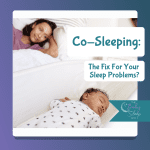
When my oldest son was a few months old, I was deep in the midst of sleep-deprivation and “mommy fog.” I remember thinking one particular thought over and over: “If he would sleep through the night just once — just once — then I could finally get a good night’s sleep.”
But when he finally did start sleeping well, I discovered something. HE could sleep through the night, but I couldn’t! Suddenly, I was the one waking up multiple times each night, unable to fall back asleep, while my son slept peacefully in his crib.
What’s that about?!
Actually, it turns out that what I experienced has a name. It’s called postnatal (or postpartum) insomnia. It often affects moms much more than dads, and it’s quite common. We brought up the issue of postnatal insomnia on our Facebook page, and a lot of moms chimed in to let us know this is something they struggle with.
What Is Postnatal Insomnia?
Postnatal insomnia happens when an exhausted mom, one who desperately needs rest, is unable to sleep even though her baby’s sleeping soundly. Postnatal insomnia has been linked to postpartum depression, but it can also appear on its own, without any noticeable depression symptoms.
Moms who struggle with postpartum insomnia often report that they feel on edge, and unable to relax. They anxiously lie awake and listen for their babies, afraid that if they fall asleep, they won’t hear their little ones cry. And when these moms finally do fall asleep? They’re awoken by the slightest sounds. (Or even “phantom” sounds that aren’t real.) This was true for me; when I was struggling with postpartum insomnia, I’d often awake convinced that I’d heard my baby cry, only to find that he was sleeping peacefully.
How To Beat Postnatal Insomnia and Get The Sleep You Need
There’s no fast fix for postnatal insomnia, unfortunately. But if postnatal insomnia is something you struggle with, there are things you can try to overcome it:
- Watch your caffeine intake. Limit yourself to one caffeinated drink per day, and make sure to drink it before noon. This will help ensure all caffeine is completely out of your system by bedtime.
- Turn off all screens (computer, TV, and phone) at least an hour before bed. Research shows us that using electronics before bed is terrible for our sleep. Electronic devices stimulate brain activity (not a good thing right before bed), and some researchers have found that the backlighting from these devices may actually lower our melatonin levels. (Melatonin is the hormone that controls sleep.) Note: screen time before bed is bad for kids’ sleep, too.
- Create a soothing bedtime routine. Take a bath, read a book, drink some herbal tea — do anything that helps you “turn off your brain” and unwind. Having a bedtime routine in place will also help signal to your brain that bedtime is approaching, and as those of you who do bedtime routines with your kids will know, that can be really helpful in promoting a good night’s sleep.
- Consider using a white noise app, MP3, or machine. This was so helpful for me. I found that the constant hum of my white noise machine helped me to relax, and it masked all the tiny, slight noises that were making it so hard for me to sleep at night. You can also download white noise MP3’s or apps, if you’d rather not pay for a machine.
- Try blackout curtains or eye masks. Light has never made it hard for me to sleep, but it used to drive my college roommate crazy. Even a little bit of light made it impossible for her to get to sleep! If that’s the case for you, think about investing in some good blackout curtains, or maybe even an eye mask.
- Try deep breathing and muscle-relaxing techniques. Simple, slow, rhythmic breathing can do wonders to help you relax and feel drowsy. You can also try focused muscle-relaxing techniques to help you calm down and feel sleepy. I used this one a lot when I was struggling with postnatal insomnia: I’d slowly tighten a muscle, and then relax it. Doing this over and over really helped me to intentionally relax my muscles, and it went a long way towards helping me at least feel sleepy.
- Ask your partner for help. If your partner or spouse is available at night, consider enlisting their help. Maybe your partner could give you a shoulder massage at bedtime, to help you relax. My husband used to scratch my back while I was trying to fall asleep, and that helped a lot. Or maybe your partner could agree to be the “on call” person at night, and listen for the baby, so that you can tune out and sleep (provided, that is, that you can trust your partner to actually wake up to the sound of the baby crying!) Even asking your partner to stay awake with you for awhile can help you feel less alone and anxious.
- Look for herbal, natural remedies. Certain essential oils such as lavender and jasmine, are proven to help people sleep longer. Certain foods can also promote sleep, like cherries, honey, and chamomile tea. Vitamin and mineral supplements can help, too. Magnesium and iron are two minerals known to help promote better sleep.
- Try non-habit forming sleeping aids. Gentle, non-addictive sleep aids like Nytol™ or Simply Sleep™ are some options to help you overcome postnatal insomnia. These sleep aids are available without a prescription. They can be taken for as long as you feel you need them. Be aware, however, that the active ingredient in these sleep aids is diphenhydramine, which is also the antihistamine ingredient in Benadryl™. Diphenhydramine may dry up breast milk in some women. Nursing mothers will want to use caution when taking it.
Don’t Hesitate to See a Healthcare Provider About Your Postnatal Insomnia
Last (but certainly not least!), consider seeing a healthcare professional about your insomnia. In fact, if your insomnia is severe, or if it’s coupled with symptoms of postpartum depression (like mood swings, overwhelming sadness, extreme irritability, or extreme anxiety), skip the recommendations above and see a doctor right away. Postnatal insomnia is a minor problem for some women, but it is a major problem for others.








